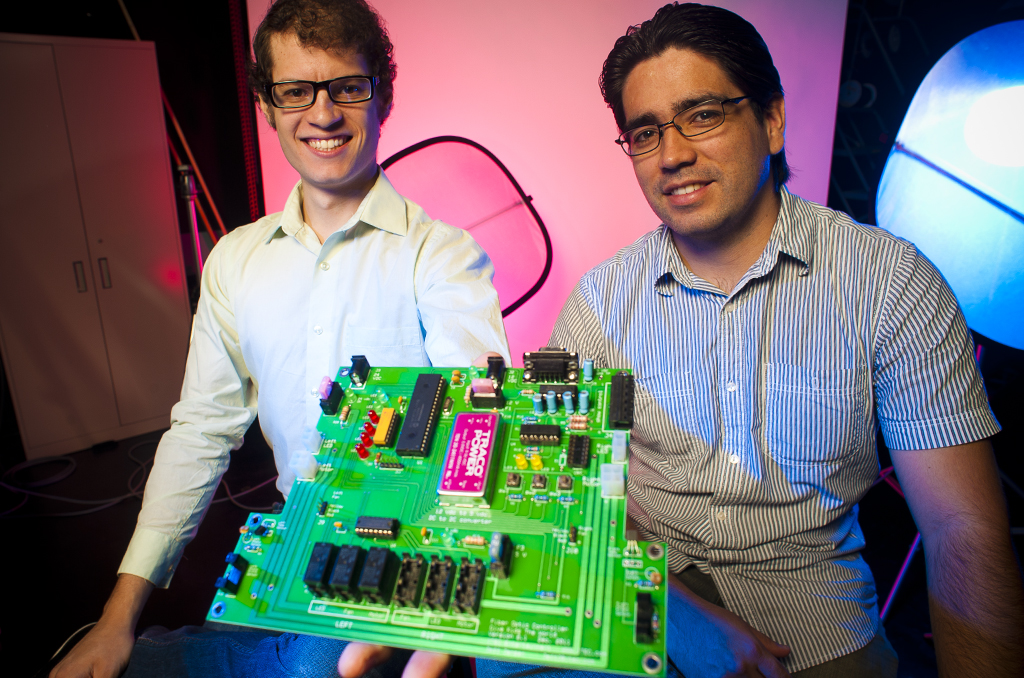Engineering students love to tinker.
So when Valencia Engineering Professor Deb Hall suggested that her students could earn extra credit for helping out at Give Kids the World — a Kissimmee resort that provides free vacations to Disney World for terminally-ill kids and their families — David Alvarez volunteered. At age 29, he’d already spent seven years working in the air-conditioning field. Now, he wanted to a chance to put his engineering class knowledge to work in the real world.
“I didn’t need the extra credit,” says Alvarez, 29. “But I wanted to see what I was capable of.”
Because he’d be working with micro-controllers, Alvarez bought some electronics kits online and began experimenting. Next, he recruited his friend and fellow Valencia student, Alex Perez, to help out — even though Perez wasn’t taking Hall’s class.
“I wanted to do something hands-on outside the classroom,” said Perez. “Plus, it seemed really interesting.”
Soon, the two students became engrossed in the work.
In addition to helping their classmates repair or install lighting in the theater, Alvarez and Perez took on a bigger project, volunteering to install a controller for the fiber-optic lights in the theater. The controller contains a computer chip, which the two Valencia students programmed to control the fans and lighting in the ceiling and the walls of the Star Tower, a facility that memorializes each sick child with a star.
The two budding engineers worked one or two Saturdays a month for about four months to finish the project. In addition to the fun of doing some hands-on engineering, there were other bonuses: The two also got to work side-by-side with industry professionals, including employees from ITEC Entertainment, an Orlando company that produces theme park rides and designs.
Now, Perez and Alvarez have moved on to another project at Give Kids the World: They’re installing an interactive “window” inside a room full of trees. Their idea, says Perez, is to make the graphics on the window voice activated. For example, if children are whispering, then the colors in the window will fade in and out. As they raise their voices, the visual effects move faster. And if they’re shouting, the window will blink red.
“There’s new hardware and chips involved, so we have to get to know how to program it,” Perez said.
Perez, 24, says the volunteer work reassured him that he’s entering the right field. “I’ve been interested in computer engineering for a while, but helping design and produce something in the real world was pretty cool,” he said.
Perez, who graduated from Oviedo High School in 2006, didn’t start his college career here at Valencia. Instead, the former honors student headed to the University of Central Florida to major in engineering. But he found the large classes overwhelming and struggled.
“You’re in a sea of people and it’s easy to zone out — unless you make a special effort,” Perez said.
“At UCF, it was hard to get any personal time with your professors,” he said. “It’s very impersonal.” Yet, until he began taking classes at Valencia, he didn’t realize how important one-on-one communication with his professors would be.
For instance, when he began taking engineering classes at Valencia, Professor Veeramuthu Rajaravivarma asked him what he wanted to do within the field of electronics engineering. When Perez said he was thinking about computer engineering and possibly robotics, Rajaravivarma introduced him to fellow student David Alvarez. Together, the two formed a robotics society at Valencia.
Unlike Perez, Alvarez took a more convoluted route to Valencia.
A native of Colombia, he moved to the United States in 2001 at age 18, arriving alone with no family. He lived in Miami for a few months before moving to Orlando. Here, he found a job working in a small convenience store. Determined to improve himself, he landed a job in the air-conditioning field.
But on weekends, Alvarez flew remote-control model airplanes. And it was there, talking to the other members of his club, that he discovered many of them shared his passions — and most were engineers. So David, who had become a U.S. citizen, decided to take some engineering classes at Valencia.
“I was getting paid very well in the air-conditioning field,” he says. “But I felt that I could do better. I have the traits to do well in school. And now I know the language better.”
Now, David — who’s married and has a little girl — is preparing to transfer to UCF to finish his bachelor’s degree in engineering.
“But right now, I’m just getting out there,” he says. “I’m getting to know people in the field. And by doing a project like this, I’m helping people too.”

Comments are closed.